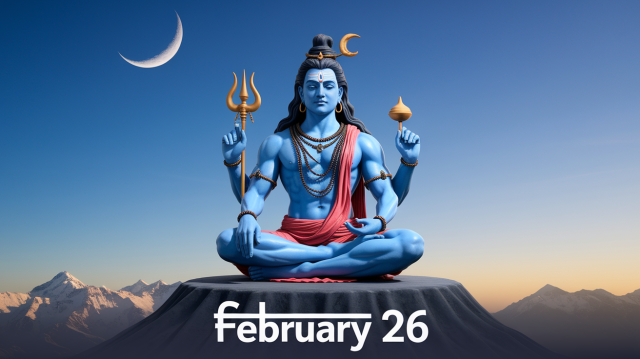Maha Shivaratri, celebrated on February 26, 2025, is one of the most significant Hindu festivals dedicated to Lord Shiva, the deity of transformation and destruction in the Hindu trinity. Known as the “Great Night of Shiva,” this auspicious occasion is marked by fervent devotion, fasting, night-long worship, and spiritual reflection. It is a time for devotees to seek blessings, overcome ignorance, and connect with the divine.
Why Is It Celebrated?
Maha Shivaratri is celebrated to honor Lord Shiva’s cosmic role as the destroyer of ignorance and ego and as a symbol of inner transformation. The festival holds several mythological associations:
- It commemorates the divine marriage of Lord Shiva and Goddess Parvati, symbolizing the union of consciousness and energy.
- It marks the night when Lord Shiva performed the Tandava, the cosmic dance of creation, preservation, and destruction.
- It is believed to be the night when Lord Shiva consumed poison during the Samudra Manthan (churning of the ocean) to save the universe, earning him the epithet “Neelkanth” (the blue-throated one).
The day also represents spiritual awakening and liberation from worldly attachments.
Cultural Significance
Maha Shivaratri reflects deep cultural and spiritual traditions. It highlights themes of devotion, self-discipline, and unity. Across India and other countries with Hindu communities, grand celebrations showcase regional customs and rituals.
Unique Traditions:
- Fasting: Devotees observe strict fasts throughout the day to purify their body and mind.
- Shiva Linga Worship: Rituals include bathing the Shiva Linga with milk, honey, water, and bel leaves.
- Night Vigils: Devotees stay awake all night in temples or homes chanting hymns like “Om Namah Shivaya” and singing devotional songs.
- Processions: In many regions, processions featuring idols of Lord Shiva are carried through streets with great fervor.
Social Impact
Maha Shivaratri unites people across diverse backgrounds in shared devotion. It fosters a sense of community through collective worship, charitable acts, and cultural events. The festival also emphasizes values like selflessness and gratitude.
The Importance of It
This day underscores the cyclical nature of creation and destruction in life. It inspires individuals to embrace change, overcome challenges, and seek inner peace. Maha Shivaratri also encourages spiritual growth by urging devotees to transcend material desires.
Educational Value
Maha Shivaratri provides an opportunity to learn about Hindu mythology, philosophy, and cultural heritage. It emphasizes principles such as mindfulness, meditation, and devotion as tools for personal transformation.
Emotional Connection
For many devotees, Maha Shivaratri is an intensely personal experience that fosters a deeper connection with Lord Shiva. The rituals evoke feelings of reverence, gratitude, and spiritual fulfillment.
The Origin of It
The origins of Maha Shivaratri are rooted in ancient Hindu scriptures such as the Skanda Purana and Linga Purana. These texts recount various legends associated with Lord Shiva’s divine acts:
- His cosmic dance (Tandava) symbolizing creation and destruction.
- His marriage to Goddess Parvati.
- His act of drinking poison during Samudra Manthan to save creation.
Historical Events:
- Ancient Temples: Historic temples like Kashi Vishwanath in Varanasi have long been centers for Maha Shivaratri celebrations.
- Cultural Festivals: Dance festivals like Natyanjali at Chidambaram Temple celebrate Lord Shiva’s connection to art.
Evolution Over Time:
While rooted in religious traditions, Maha Shivaratri has gained global recognition among spiritual seekers for its emphasis on meditation and self-awareness.
How to Celebrate
Here are meaningful ways to observe Maha Shivaratri:
- Visit Temples: Participate in rituals like offering milk or bel leaves at a Shiva temple.
- Practice Meditation: Engage in deep meditation or yoga to align your energies with cosmic vibrations.
- Chant Mantras: Recite “Om Namah Shivaya” for spiritual cleansing.
- Perform Charity: Donate food or essentials to those in need as an act of devotion.
- Stay Awake: Spend the night in prayer or reflection honoring Lord Shiva’s cosmic role.
Conclusion
Maha Shivaratri is a profound celebration that transcends religious boundaries by inspiring devotion, self-reflection, and spiritual growth. By participating in its rituals or meditating on its themes, individuals can connect with their inner selves while honoring Lord Shiva’s transformative power. Let us embrace this sacred night as an opportunity for renewal and enlightenment!












